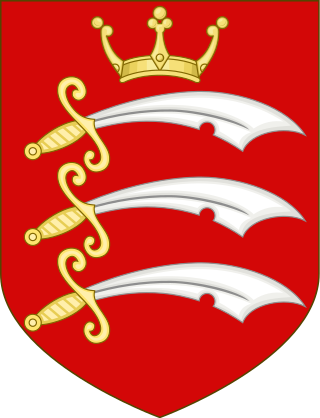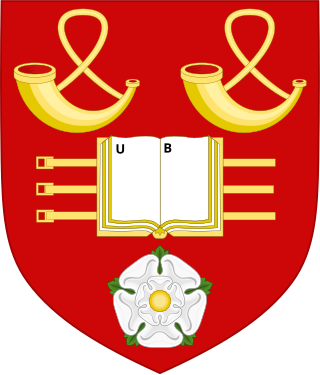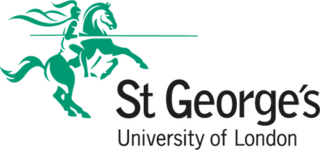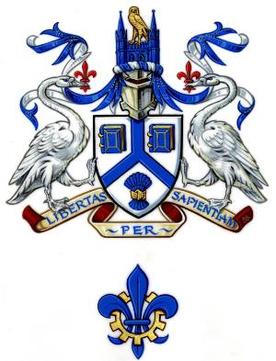Related Research Articles

Anglia Ruskin University (ARU) is a public university located in East Anglia, United Kingdom. Its origins trace back to the Cambridge School of Art (CSA), founded by William John Beamont, a Fellow of Trinity College at the University of Cambridge, in 1858. The institution became a university in 1992 and was renamed after John Ruskin, the Oxford University professor and author, in 2005. Ruskin delivered the inaugural speech at the Cambridge School of Art in 1858. ARU is classified as one of the "post-1992 universities." The university's motto is in Latin: Excellentia per societatem, which translates to Excellence through partnership in English.

The University of Bath is a public research university in Bath, England. It received its royal charter in 1966, along with a number of other institutions following the Robbins Report. Like the University of Bristol and University of the West of England, Bath can trace its roots to the Merchant Venturers' Technical College, established in Bristol as a school in 1595 by the Society of Merchant Venturers. The university's main campus is located on Claverton Down, a site overlooking the UNESCO World Heritage city of Bath, and was purpose-built, constructed from 1964 in the modernist style of the times.

The Open University (OU) is a public research university and the largest university in the United Kingdom by number of students. The majority of the OU's undergraduate students are based in the United Kingdom and principally study off-campus; many of its courses can also be studied anywhere in the world. There are also a number of full-time postgraduate research students based on the 45-hectare (110-acre) university campus at Walton Hall, Milton Keynes, Buckinghamshire, where they use the staff facilities for research, as well as more than 1,000 members of academic and research staff and over 2,500 administrative, operational and support staff.

Middlesex University London is a public research university based in Hendon, northwest London, England. The university also has campuses in Dubai and Mauritius. The name of the university is derived from its location within the historic county boundaries of Middlesex.

The University of Essex is a public research university in Essex, England. Established by royal charter in 1965, it is one of the original plate glass universities. The university comprises three campuses in the county, in Southend-on-Sea and Loughton with its primary campus in Wivenhoe Park, Colchester.
Degree abbreviations are used as an alternative way to specify an academic degree instead of spelling out the title in full, such as in reference books such as Who's Who and on business cards. Many degree titles have more than one possible abbreviation, with the abbreviation used varying between different universities. In the UK it is normal not to punctuate abbreviations for degrees with full stops, although this is done at some universities.

The University of Bradford is a public research university located in the city of Bradford, West Yorkshire, England. A plate glass university, it received its royal charter in 1966, making it the 40th university to be created in Britain, but can trace its origins back to the establishment of the industrial West Yorkshire town's Mechanics Institute in 1832.

Oxford Brookes University is a public university in Oxford, England. It is a relatively new new university, having received university status through the Further and Higher Education Act 1992. The university was named after its first principal, John Henry Brookes, who played a major role in the development of the institution.

St George's, University of London (SGUL), legally the St George's Hospital Medical School, was a public university in South London, England. It merged with City, University of London to form City St George's, University of London in August 2024. The names "City, University of London" and "St George’s, University of London" will provisionally continue as trading names until March 2025.

The University of Lincoln is a public research university in Lincoln, England, with origins dating back to 1861. It gained university status in 1992 and its present name in 2001. The main campus is in the heart of the city of Lincoln alongside the Brayford Pool. There are satellite campuses across Lincolnshire in Riseholme and Holbeach and graduation ceremonies take place in Lincoln Cathedral.

Glasgow Caledonian UniversityIPA:[ˈɔlhɪjˈxaʎan̪ˠəxˈɣl̪ˠas̪əxu]), informally GCU, Caledonian or Caley, is a public university in Glasgow, Scotland. It was formed in 1993 by the merger of The Queen's College, Glasgow and Glasgow Polytechnic.
Honours degree has various meanings in the context of different degrees and education systems. Most commonly it refers to a variant of the undergraduate bachelor's degree containing a larger volume of material or a higher standard of study, or both, rather than an "ordinary", "general" or "pass" bachelor's degree. Honours degrees are sometimes indicated by "Hons" after the degree abbreviation, with various punctuation according to local custom, e.g. "BA (Hons)", "B.A., Hons", etc. In Canada, honours degrees may be indicated with an "H" preceding the degree abbreviation, e.g. "HBA" for Honours Bachelor of Arts or Honours Business Administration.

Queen Margaret University Edinburgh is a university founded in 1875 and is located wholly within the county of East Lothian on the outskirts of Musselburgh. It is named after the Scottish Queen Saint Margaret (1045–1093).

The University of the Highlands and Islands (UHI) is an integrated, tertiary institution encompassing both further and higher education. It is composed of 12 colleges and research institutions spread around the Highlands and Islands, Moray and Perthshire regions of Scotland. UHI offers further education, undergraduate, postgraduate and research programmes which can be studied at a range of locations across the area and online. It has 31,000 students, including 19,779 further education students and 11,210 higher education students.
A Master of Physics honours (or MPhys (Hons)) degree is a specific master's degree for courses in the field of physics.

Swansea University Medical School is a medical school on Swansea University's Singleton campus. It is linked to additional teaching centres located throughout South and West Wales, including Cefn Coed Hospital, Singleton Hospital and Morriston Hospital in Swansea, Prince Philip Hospital in Llanelli, Withybush General Hospital in Haverfordwest and Bronglais Hospital in Aberystwyth. The Medical School also has a network of primary care teaching centers.
Keele University School of Allied Health Professions (SAHP) is a teaching department of Keele University, Staffordshire, England. All programmes offered by the school are taught in the MacKay Building on the Keele University campus near Newcastle-under-Lyme. The school also uses facilities at the Keele University Medical School and from the wider university. The school offers educational programmes at undergraduate and postgraduate levels. There is an active research focus within the school with many of the teaching staff being members of Research Institutes at the university. The school is a regional hub of the National Physiotherapy Research Network.
A Bachelor of Medical Sciences (BMedSci, BMedSc, BSc(Med), BMSc) is an undergraduate academic degree involving study of a variety of disciplines related to human health leading to an in depth understanding of human biology and associated research skills such as study design, statistics and laboratory techniques. Such disciplines include biochemistry, cell biology, physiology, pharmacology or psychosocial aspects of health. It is an equivalent level qualification to the more commonly awarded Bachelor of Science (BSc). Graduates may enter a diverse range of roles including post-graduate study, higher education, the biotechnology industry, the pharmaceutical industry, consultancy roles, scientific communication, education or unrelated disciplines which make use of the broad range of transferable skills gained through this degree.

Gautam Buddha University ("GBU") is a university established by the Uttar Pradesh Gautam Buddha University Act 2002 and came into existence in 2008. It is approved by University Grants Commission (UGC) under section 12-B and accredited by National Assessment and Accreditation Council (NAAC) with B+ grade. It is located in Greater Noida, Gautam Buddha Nagar in Uttar Pradesh, India. It is one of Uttar Pradesh's state government universities which commenced its first academic session in the year 2008. The university campus is spread over 511 acres (207 ha) and offers Bachelors, Masters and Doctoral degrees in engineering, Business Administration, Computer Applications, Biotechnology and Buddhist Studies and is mainly focused on research.

The UCL Division of Psychology and Language Sciences is a Division within the Faculty of Brain Sciences of University College London (UCL) and is located in London, United Kingdom. The Division offers teaching and training and undertakes research in psychology and communication and allied clinical and basic science. It is the largest university psychology department in England.
References
- 1 2 3 4 5 6 University of Bath. "Laboratories | University of Bath". www.bath.ac.uk. Retrieved 30 September 2017.
- 1 2 University of Bath. "About us | University of Bath". www.bath.ac.uk. Retrieved 30 September 2017.
- ↑ "University guide 2018: league table for psychology". the Guardian. Retrieved 1 October 2017.
- ↑ Baber, Andrew (17 May 2017). "Mixed fortunes for Bath's universities in new Guardian Guide". bathchronicle. Retrieved 1 October 2017.
- ↑ "Psychology - Top UK University Subject Tables and Rankings 2018" . Retrieved 30 September 2017.
- ↑ Times, The Sunday. "Good University Guide 2018". ISSN 0140-0460 . Retrieved 30 September 2017.
- ↑ University of Bath. "10 West | University of Bath". www.bath.ac.uk. Retrieved 30 September 2017.
- ↑ "10 West Psychology Buildings - University of Bath architecture". AWW. Retrieved 1 October 2017.
- ↑ University of Bath (20 September 2016). "Professor Gregory Maio appointed new Head of Department of Psychology | University of Bath". www.bath.ac.uk. Retrieved 4 October 2017.
- ↑ University of Bath (8 May 2017). "Department of Psychology celebrates its 20th Birthday | University of Bath". www.bath.ac.uk. Retrieved 4 October 2017.
- ↑ Petherick, Sam (14 September 2017). "Bath students' quest to explain hoarding which affects 7,000 city residents". bathchronicle. Retrieved 4 October 2017.
- ↑ "Smart energy device personalises savings readings for consumers". HeraldScotland. Retrieved 4 October 2017.
- ↑ "New facial recognition findings could help develop new treatments for conduct disorder". EurekAlert!. Retrieved 4 October 2017.
- ↑ Hayhurst, Claire. "Study of teens with severe conduct disorder reveals emotion recognition difficulties" . Retrieved 4 October 2017.
- ↑ Doward, Jamie (24 January 2016). "Wearing a bike helmet might make you more dangerous". The Observer. ISSN 0029-7712 . Retrieved 4 October 2017.
- ↑ University of Bath. "Undergraduate | University of Bath". www.bath.ac.uk. Retrieved 30 September 2017.
- ↑ "Find an accredited course | BPS Beta Site". beta.bps.org.uk. Retrieved 30 September 2017.
- 1 2 3 "Psychology (C801) - University of Bath (B16) - Which? University". university.which.co.uk. Retrieved 4 October 2017.
- ↑ "Psychology - Unistats". unistats.ac.uk. Retrieved 4 October 2017.
- ↑ University of Bath. "Postgraduate | University of Bath". www.bath.ac.uk. Retrieved 30 September 2017.
- ↑ "University of Bath | Department of Psychology". ResearchGate. Retrieved 4 October 2017.
- 1 2 University of Bath. "Social & Cultural Psychology | University of Bath". www.bath.ac.uk. Retrieved 30 September 2017.
- ↑ University of Bath. "Cognition, Affective Science & Technology Laboratories | University of Bath". www.bath.ac.uk. Retrieved 30 September 2017.
- ↑ University of Bath. "CREATE Lab | University of Bath". www.bath.ac.uk. Retrieved 30 September 2017.
- ↑ University of Bath. "Research | University of Bath". www.bath.ac.uk. Retrieved 30 September 2017.
